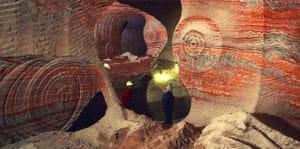
An epoch, as defined by Merriam-Webster’s dictionary, is an event or a time marked by an event that begins a new period or development; traditionally in reference to a division of geologic time that is less than a period and greater than an age. The current one is the Holocene Epoch of the Quaternary Period. As the geologic timescale is explored and researched, there is a movement to create a new epoch. This new timeframe would mark the beginning of human civilization’s unsustainable impact upon the Earth’s geology, ecosystems, and climate and would be called the Anthropocene.
The documentary Anthropocene: The Human Epoch sees Jennifer Baichwal, Edward Burtynsky, and Nicholas de Pencier travel to six continents and several countries to document the ways excavating, terraforming, mining, hunting, and other such human activities are transforming the natural landscapes. In Ethiopia, there is a ceremonial burning of the tusks of felled elephants. This is to ensure that the ivory will not wind up on the black market.

“…a ceremonial burning of the tusks… is to ensure that the ivory will not wind up on the black market.”
In the city of Norilsk, located in Siberia and is the world’s northernmost city, the smelting of nickel, copper, and palladium has created one of the most polluted places of all time. The 100,000 citizens have to deal with not just the almost constant snow but also with the ever piling trash and constant fumes from the factories. Immerath is home to Germany’s largest pit mine. The trio of passionate filmmakers trek to Venice, Italy and discover how quickly it is sinking.
At each locale, they interview experts, workers, government officials, and the like to understand why they live there, how they are monitoring their environmental impact, and what changes have years of destroying the landscape wrought. In between these more focused segments is Alicia Vikander’s narration talking about how old the Earth is, the way in which such things are measured, and how humans have interrupted the natural cycle of various ecosystems.
While it is all gorgeously shot by de Pencier, who served as the director of photography for the film, Anthropocene: The Human Epoch never engrosses the audience. Despite the impressive scale of its goals, it never convincingly makes its case. This is because the documentary stretches itself too thin. By going to so many places and establishing so much human degradation of the natural landscapes, it fails to follow through on any of its cases, so nothing has much impact as the movie believes it does.

“…power is meant to come from the images of these awe-inspiring landscapes juxtaposed with humankind slowly chipping away at them.”
The power is meant to come from the images of these awe-inspiring landscapes juxtaposed with humankind slowly chipping away at them. While a case for the inclusion of the Anthropocene epoch seems reasonable based on these scenes, they do not make for a compelling narrative. Only one moment, involving a sped up tunnel ride, achieves the desired effect and even then, it quickly dissipates as the scene lasts too long.
I can’t exactly call Anthropocene: The Human Epoch a bad movie as it is made with good intentions and the cinematography is truly epic and sweeping. However, there is little reason to be invested, as it is too many things at once, with too little to say about any of them. Throw in Vikander’s lifeless narration, and what you have is a passion project lacking passion.

Anthropocene: The Human Epoch (2019) Directed by Jennifer Baichwal, Edward Burtynsky, Nicholas de Pencier. Written by Jennifer Baichwal. Starring Alicia Vikander.
4 out of 10 Gummi Bears
